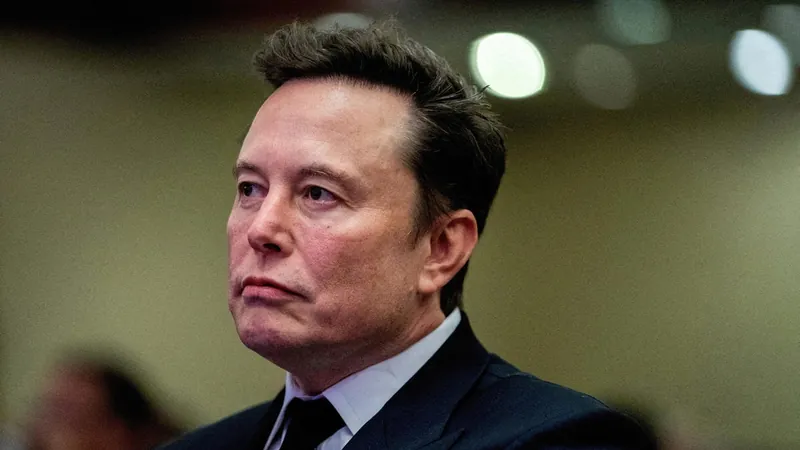
European Leaders Sound Alarm Over Elon Musk's Political Interference on X
2025-01-07
Author: Lok
Introduction
In a surprising turn of events, Elon Musk, the world's wealthiest individual and a relentless social media influencer, has found himself at the center of a political storm in Europe. Recently, his provocative posts on the X platform have drawn sharp criticism from various European leaders, sparking fears about the implications of a billionaire meddling in the political affairs of sovereign nations.
Concerns from UK Leadership
Musk's online activity has not gone unnoticed, particularly by British Prime Minister Keir Starmer, who voiced his concerns in a news conference. While he refrained from naming Musk directly, Starmer condemned figures spreading misinformation, accusing them of peddling dangerous narratives that bolster extremism. He characterized their actions as contributing to a “poison of the far right” and emphasized a lack of concern for those victimized by such rhetoric.
Musk's Controversial Remarks in the UK
In the UK, Musk has notably called for the release of Tommy Robinson, a controversial far-right figure recently imprisoned for disseminating false claims about a refugee. His rhetoric has escalated to proclamations such as “America should liberate the people of Britain from their tyrannical government,” sparking outrage among many political leaders and social justice advocates.
Endorsement of Far-Right Politics in Germany
Across the Channel in Germany, Musk controversially endorsed the far-right Alternative for Germany (AfD) party, suggesting that they are the only group capable of “saving” the nation from an impending economic and cultural collapse. His comments have amplified concerns regarding rising extremism in Europe, particularly among voters who feel marginalized by mainstream politics.
Criticism of Canadian Leadership
In Canada, the tech mogul was equally scathing towards Prime Minister Justin Trudeau, labeling him an “insufferable fool” amidst Trudeau's recent announcement of intentions to resign. Musk's shifting political commentary seems to align with his support for populist leaders, like Pierre Poilievre, who has criticized government inefficiencies and controversial climate policies.
Speculation on Musk’s Motives
Experts in political science speculate on Musk's motives, suggesting he could be trying to position himself as a disruptor, challenging the traditional media narrative that he and his supporters claim to be misleading. However, critics argue that Musk's interventions may exacerbate existing political divisions, pointing out that his lack of nuanced understanding of complex issues could lead to greater instability.
Changing Views on Nigel Farage
In a recent twist, Musk has altered his stance towards Nigel Farage, a prominent figure in the UK’s right-wing political landscape, indicating that their paths may diverge due to conflicting views on supporting extremist figures like Robinson.
Reactions from European Leaders
Leaders from France and Norway, including President Emmanuel Macron and Prime Minister Jonas Gahr Støre, voiced their concerns over Musk's influence, raising alarms about the potential consequences of his engagement in politics outside of the United States. Macron remarked, “Ten years ago, who would have imagined that the owner of one of the world’s largest social networks would support a new international reactionary movement?” Similarly, Støre expressed unease over Musk’s direct involvement in foreign political affairs.
Upcoming Discussion on X
Musk is expected to host an upcoming live discussion on X with Alice Weidel, the leader of the AfD, which has been scrutinized for its extremist views. This event is poised to provoke further backlash and raises questions about the responsibilities of social media platforms in mitigating the spread of extremist ideologies.
Conclusion
As Musk's online presence continues to influence political climates across Europe, the call for vigilance against misinformation and radicalization has never been clearer. Will Musk's involvement lead to a renaissance of political discourse or a surge in division and hostility? Only time will tell.



 Brasil (PT)
Brasil (PT)
 Canada (EN)
Canada (EN)
 Chile (ES)
Chile (ES)
 Česko (CS)
Česko (CS)
 대한민국 (KO)
대한민국 (KO)
 España (ES)
España (ES)
 France (FR)
France (FR)
 Hong Kong (EN)
Hong Kong (EN)
 Italia (IT)
Italia (IT)
 日本 (JA)
日本 (JA)
 Magyarország (HU)
Magyarország (HU)
 Norge (NO)
Norge (NO)
 Polska (PL)
Polska (PL)
 Schweiz (DE)
Schweiz (DE)
 Singapore (EN)
Singapore (EN)
 Sverige (SV)
Sverige (SV)
 Suomi (FI)
Suomi (FI)
 Türkiye (TR)
Türkiye (TR)
 الإمارات العربية المتحدة (AR)
الإمارات العربية المتحدة (AR)